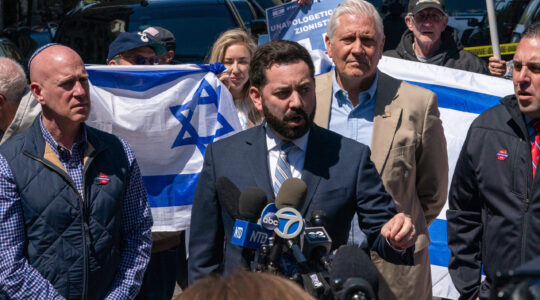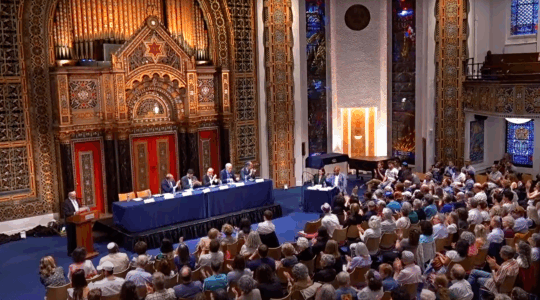NASHVILLE, Tenn (JTA) – The following is a transcript of an interview between JTA staffers and Condoleezza Rice, the U.S. secretary of state, on Tuesday, Nov. 13. 2007.
JTA: We’ve seen reports that it looks like now the Annapolis meeting is going to be a day?
Rice: Well, let’s wait first to call it and secondly to invite people and then to schedule it.
JTA: So it’s not even safe to say it’s going to happen?
Rice: Oh, it’s going to happen. Look, we’ll look at the scheduling for it. I don’t see it going on for several days, most certainly. It’s after all an opportunity to try and launch a process, not to try and conclude it at Annapolis.
JTA: Do you have a sense of what you’re hoping to get at?
Rice: I think that when Prime Minister Olmert spoke to the Saban forum a couple of weeks ago, a week ago, it seems like longer, that he made the clearest indication of how that meeting could be used, which is to, I think he said, use this as a springboard to launch continuous ongoing negotiations toward the establishment of a two-state solution and so that’s what I expect it to do.
JTA: What would be the implications if the Saudis do not participate?
Rice: Well, again I don’t want to speculate about participation, it’s obviously very important that all key actors at this point look at what they can do to support the bilateral track that Prime Minister Olmert and President Abbas have undertaken.
JTA: It’s not definite yet that the Saudis would do that?
Rice: We haven’t sent any invitations so we haven’t expected any answers.
JTA: There is a debate in the international community over whether there’s a red line of Iranian nuclear know-how versus capability. Last month, President Bush said: “So I told people that if you’re interested in avoiding World War III, it seems like you ought to be interested in preventing them from having knowledge necessary to making a nuclear weapon.” Does the president believe that nuclear know-how is the red line?
Rice: Let’s not take the president’s remarks out of context. I think what the president was speaking to here is the kind of instability one would face if you had an Iran capable at any time that it wished of making a nuclear weapon. And that’s the issue, the issue is not what is a red line for us, what is a red line for someone else; the issue is what kind of Middle East do you want to see? And an Iran that has reached the kind of capability that would allow it to make a nuclear weapon would certainly make it a very unstable Middle East.
JTA: Does the president think that know-how is the line?
Rice: Let me just speak to what the international community has told Iran, which is that it needs to stop enriching and reprocessing and start negotiations. Now why is it focused on stopping enrichment and reprocessing? Because you can have a civil nuclear program and not reprocess yourself. The Russians have offered the Iranians a deal about how to do a fuel takeback, or fuel provision to a reactor and take it back, the president has talked about this, Mohammed ElBaradei has talked about this, so you could have a civil nuclear program and not enrich and reprocess; that’s what the international community is saying to Iran.
Now if you have enrichment and reprocessing capability, at some point you get to the point – and it’s by the way a complicated process, it’s not so easy – – that you get to the point where you enrich and enrich and enrich to the point that you can get to high enough grades of material, fuel to have a nuclear weapon. An so in effect the international community’s strategy has been to prevent Iran from getting to the stage
JTA: Given the large gap between Israeli and Palestinians expectations, there’s the real fear that a failure would result in a new wave of violence
Rice: First, I’ve been out there, I’ve been talking to the parties a lot, I think their views of what Annapolis can do are converging and I think this focus is much more on the day after as foreign Minister Livni has called it.
The day after is really when you have to get down to the business of trying to come to an agreement, they’re not going to create a Palestinian state at Annapolis, they’re not going to create it four days after Annapolis, that is work that has to be done in detailed, ongoing, continuous negotiations. And so Annapolis is for the parties to come together, to have the international community launch them, to have an opportunity for Prime Minister Blair to talk about what he is doing, to build the capacity of the Palestinians so that they could govern a state; I would hope for the Arabs to make clear that they are prepared to both support the Palestinians and reach out to the Israelis, and to have some confidence building measures that are based on phase one obligations of the road map to show that this is all serious.
I think that’s where we are converging. Now there was an earlier time when there was a question about whether their joint document was going to have the basics of the deal. I think it’s not surprising that when people recognize that there’s going to be a day after, they focus on the day after, not the day of.
No one can afford failure. I’ve said failure isn’t an option. But not acting is failure, in these circumstances, because not acting when you have a Palestinian partner who is dedicated against violence and against terrorism, and who is struggling against an alternative view for the Palestinians, not acting I think has much, much more significant risk than acting.
JTA: Is your sense that the Arab parties and the Palestinians are now accepting Olmert’s view of what this conference needs to be?
Rice: I heard President Abbas talking about the launch of negotiations, I think he still has some work to do in terms of how do you characterize those negotiations, but it’s no secret to anyone that the key here at Annapolis, is that once Annapolis is over, they need, the parties need to have the sense from the international community that they are going to be supportive through what is going to be a difficult process of coming to a two-state solution.
They’re going to have to resolve a lot of issues that are historic, a lot of issues that have not ever been resolved before, a lot of issues about which they have barely talked over the last six years! So I think people know that that’s going to be hard. I do think that there’s some hope on both sides, that there will be some fulfillment of road map phase one obligations so that the parties know that they’re both serious.
JTA: One of those obligations is the settlement issue. What commitments from the Israelis have you gotten on that issue?
Rice: The American position on this is clear, which is the road map position, that settlement activity is not consistent with the roadmap, but what I’ve heard, but there are a lot of other elements of the road map as well, including for the Palestinians to dismantle the infrastructure of terror. Now frankly some of the things that have been done recently, in terms of the closing down of charities, the freezing of bank accounts, is a very good start. The security operations that are going on in Nablus are a good start. So both sides are going to need to carry out their obligations, and the United States will be pressing both.
JTA: Do you plan to resist the subpoena to testify at the Rosen-Weissman trial?
Rice: Look, I’m not going to comment on a legal matter. Obviously, I always cooperate with our legal system, but I’m not going to talk about specifics of this case.
JTA has documented Jewish history in real-time for over a century. Keep our journalism strong by joining us in supporting independent, award-winning reporting.





